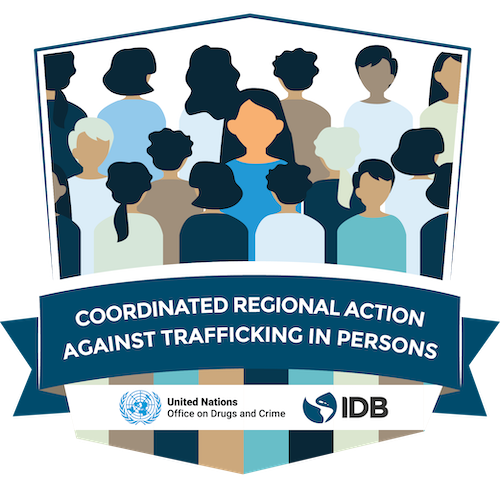Coordinated Regional Action Against Trafficking in Persons from the Security and Justice Sector

Issued on 14 Oct 2025 by

Banco Interamericano de Desarrollo
The Inter-American Development Bank and the United Nations Office on Drugs and Crime issues the following digital badge and certify that the recipient has successfully completed the course “Coordinated Regional Action Against Trafficking in Persons from the Security and Justice Sector”, having acquired the skills to analyze and apply coordinated and effective strategies and actions to combat trafficking in persons, with a focus on prevention, protection, investigation and prosecution, and transnational cooperation from the perspective of the security and justice sectors.
Issuer

Banco Interamericano de Desarrollo
BID-INDES@iadb.org
Criteria
Learning objectives / Outcomes
- Distinguish the key approaches that guide coordinated regional action against trafficking in persons within the security and justice sectors.
- Identify key guidelines for effectively addressing trafficking in persons through the security and justice sectors in Latin American and Caribbean countries.
- Recognize the importance of coordinating efforts in prevention, assistance, protection, prosecution, and transnational cooperation to effectively combat trafficking in persons.
- Identify good practices and key challenges related to combating trafficking in persons in Latin American and Caribbean countries.
Sectors (BIDAcademy)
Institutional Development | Social Development
Learning experience and activities
This credential was obtained through a self-paced learning modality, allowing the participant to progress at their own pace through the following activities:
- Critical analysis of multimedia resources, infographics, and websites focused on the theoretical and methodological foundations of coordinated action to combat trafficking in persons.
- Completion of reflection exercises based on the case-based method, focusing on how to address the crime of trafficking in persons in the fields of prevention, investigation, prosecution, assistance, protection, and international cooperation.
- Systematic knowledge appropriation exercises conducted within each course module.
- Active and collaborative participation in discussion forums focused on finding solutions to trafficking in persons cases focusing on the fields of prevention, investigation, prosecution, assistance, protection, and international cooperation.
- Active participation in two optional synchronous sessions, designed to explore key aspects of the course in greater depth and facilitate the exchange of questions and insights with experts and peers.
- Final knowledge appropriation exercise.
Course content
- Concept, modalities, and purposes of Trafficking in Persons.
- Characteristics of various approaches to addressing Trafficking in Persons, along with the main actions involved in their implementation.
- Current landscape of Trafficking in Persons at both global and regional levels.
- Myths and Realities of Trafficking in Persons.
- Offences related to Trafficking in Persons.
- Concepts of prevention, investigation and prosecution, assistance and protection, and international cooperation in combating Trafficking in Persons.
- International instruments supporting coordinated action to combat Trafficking in Persons.
- Key gender and digital approaches to coordinated action against Trafficking in Persons.
- Main challenges in the fields of prevention, investigation and prosecution, assistance and protection, and international cooperation in combating Trafficking in Persons.
- Key directives and guidelines for intra-national and cross-sectoral coordination and action in the fields of prevention, investigation and prosecution, assistance and protection, and international cooperation in response to Trafficking in Persons.
- Self-assessment of progress and identification of opportunities for improvement by States in the coordinated response to Trafficking in Persons.
Assessment
This credential is granted upon achieving a final score of 70/100 or higher, based on the completion of the following activities:
- Five quizzes, each consisting of five multiple-choice questions and allowing up to three attempts, designed to assess the knowledge acquired in each of the five course modules. These have a weight of 15% for the final assessment score.
- One quiz consisting of fifteen multiple-choice questions, and allowing up to three attempts, designed to assess the knowledge acquired throughout the course. These have a weight of 25% for the final assessment score.
- Active participation in four discussion forums on key topics related to coordinated action against Trafficking in Persons; these are optional and do not carry any weight in the final assessment.
- Active participation in two optional synchronous sessions, designed to explore key aspects of the course in greater depth and facilitate the exchange of questions and insights with experts and peers.
- Self-assessment of institutional progress in addressing Trafficking in Persons in the fields of prevention, investigation, prosecution, assistance, protection, and international cooperation.
Estimated effort
Completing the coursework is expected to require approximately 15 hours of dedicated study time.
Badge type
Assessment Badge
Alignments
IDB Digital Credential Framework
https://credencialesbid.openbadgepassport.org/app/profile/page/view/312

